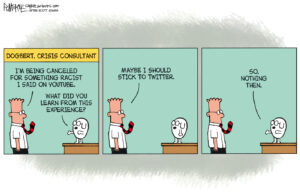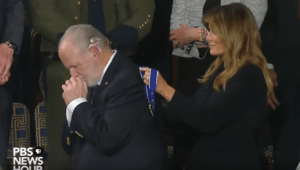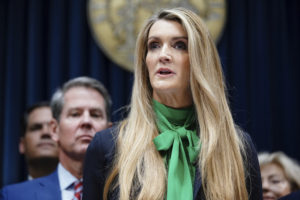Conservatives Play the Victim as Harvard Pulls Parkland Student’s Acceptance
Right-wing pundits see college’s decision over racist comments by shooting survivor Kyle Kashuv as part of a larger pattern of attacks. Kyle Kashuv speaks at the National Rifle Association Institute for Legislative Action Leadership Forum in 2019. (Michael Conroy)
Kyle Kashuv speaks at the National Rifle Association Institute for Legislative Action Leadership Forum in 2019. (Michael Conroy)
Kyle Kashuv, a survivor of the 2017 shooting at Marjory Stoneman Douglas High School in Parkland, Fla., announced on Twitter on Monday that Harvard rescinded his acceptance because of racist comments written on a shared Google doc and in text messages when he was 16. The decision enraged many prominent conservative pundits, who saw the decision as yet more evidence their viewpoints are under attack.
Last month, a video that included screenshots of the comments, including racial slurs, was posted by Ariana Ali, a former classmate. Kashuv, as The New York Times points out, used “a racial slur for African Americans more than a dozen times. … In a different screenshot of a text message, Mr. Kashuv also used the slur to refer to black student athletes.” The video led Harvard to rescind the acceptance.
Ben Shapiro, editor in chief of the Daily Wire, emphasized the private nature of the comments in his commentary: “Is the new standard that if you said something on a private message board when you were 16 years old that we should deny you the possibility of a degree at a top college, so long as those who join you on that message board decide to out you?”
In Reason, Robby Soave called Harvard’s decision a “major victory for the online mobs of cancel culture.”
Kashuv’s political views are often at odds with his fellow Parkland survivors. After the horrific Parkland shooting, many of the surviving students, including David Hogg and Emma Gonzalez, became activists. They organized the March for Our Lives in support of gun control and often spoke out against the policies of the Trump administration. Kashuv was an outlier among his classmates, a conservative defender of the Second Amendment who met with President Trump and favored arming school staff instead of limiting access to guns.
Kashuv told Vox’s Jane Coaston that he was contrite: “What I said there is something that I’m deeply embarrassed by, and I’m truly regretful.” He said, “I know that forgiveness isn’t given, it’s earned,” and described reaching out to Harvard’s Office of Diversity and Inclusion to seek guidance.
Conservative commentator Erick Erickson brought religion into the debate, tweeting that “the progressive blackballing of Kyle Kashuv is a reminder that there’s no concept of grace in the secular religion.”
This reaction, as Ashley Fetters observes in The Atlantic, proved to be a popular one among the right. She explains:
When a public figure’s racist, sexist, or otherwise offensive behavior comes to light, widespread condemnation and calls to stop supporting that person tend to follow—especially on social media, where people often say that person is “canceled.” Some conservatives feel this shows an unwillingness to acknowledge a person’s growth and learning from mistakes.
Pleas to forgive Kashuv also raise questions of who gets to be forgiven or who gets punished, and how often people of color are not afforded the opportunity for forgiveness.
As Fetters observes, ”When some right-leaning voices discussed the deaths of unarmed black children, including Trayvon Martin, Tamir Rice, Michael Brown, and Laquan McDonald, who were gunned down on the mere suspicion of wrongdoing, they focused on perceived misbehavior on the part of the kids.”
At least one Republican, however, isn’t buying Kashuv’s contrition. Former Rep. David Jolly, R-Fla., told MSNBC’s Stephanie Ruhle that his comments “are the social media postings we see of a shooter.”
Your support matters…Independent journalism is under threat and overshadowed by heavily funded mainstream media.
You can help level the playing field. Become a member.
Your tax-deductible contribution keeps us digging beneath the headlines to give you thought-provoking, investigative reporting and analysis that unearths what's really happening- without compromise.
Give today to support our courageous, independent journalists.






You need to be a supporter to comment.
There are currently no responses to this article.
Be the first to respond.